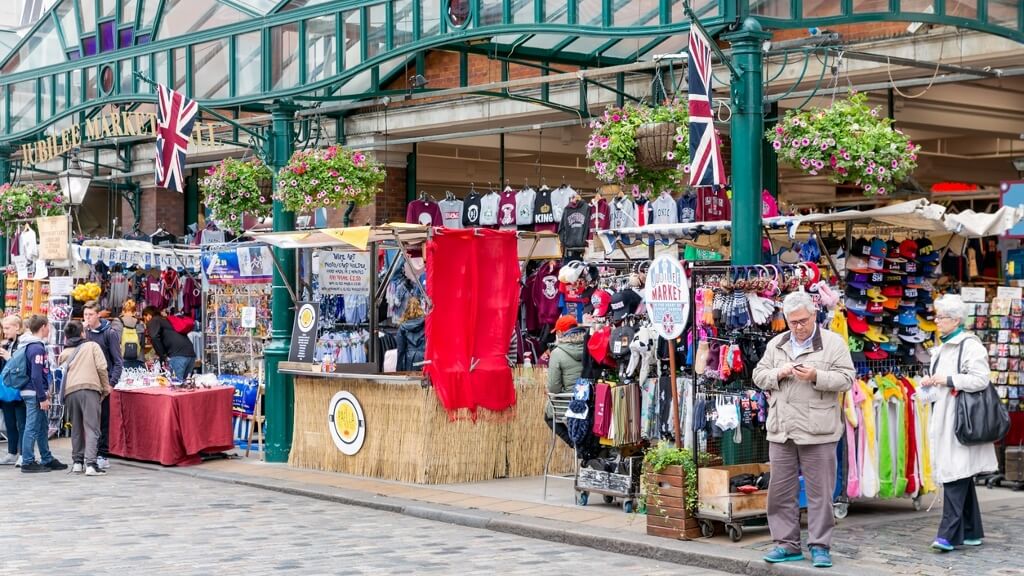Why Are Gift Shops Disappearing In The UK But Not In France?
Coffee, the decline of window shopping and thrifty Brits could all be to blame.

The UK high street has been declining since the 2008 financial crisis. With a dwindling number of gift shops surviving the tough trading environment, UK wholesale companies are looking to Europe where the gift shop has not only survived, but even thrived.
As a wholesaler based in the UK, we’ve enjoyed seven consecutive years of increasing export figures, up from an initial 5% to around 45% of turnover. France is our largest export market, and whilst this can in part be credited to a strong European demand for bright, colourful gifts with a quirky British feel, it is also due to the fact that high street gift shops are thriving on the continent.
But why is this? Is it changing taste in British consumer behaviour? a cultural difference? or is it down to state regulation and the resulting effect on how shops can operate?
Coffee shops
The British have embraced the high street coffee shop with gusto and it’s difficult not to notice the large number of independent and chain coffee shops in cities across the UK, especially in London.
Often seen as a symbol of gentrification, the trend of numerous coffee shops arriving on the UK high street has, in some ways, precipitated the demise of gift shops who cannot compete with such cash generative competition at the time of shop lease renewals.
Cultural attitudes
But of course the reasons for the different fates of gift shops in the UK vs France can’t all be blamed on your local coffee shop raising the price of the rent. In France, for example, the costs of renting a shop may be cheaper than in the UK, but it’s offset by higher employment costs.
So is the state of high street retail in the UK due to a different attitude towards shopping in Europe? There’s no doubt that a physical shop’s instant purchase gratification is their biggest advantage against online shopping and I can’t help thinking that shopping on the high street in France remains a daily part of life.
Independent shops are more likely to attract passing trade, evident in the care taken on presentation and character of “boutiques”.

Do Parisians enjoy window shopping more than Londoners?
Sale regulations
In the United Kingdom, as we have all experienced, major and smaller retailers seemingly have offers or reductions every few weeks. It seems everything is priced up in order to be reduced. Nobody is quite sure what represents fair value or price and inevitably take to the internet to find the cheapest price and ensure they are not overpaying.
This leads to a trend of UK shoppers using physical stores as a kind of window shopping experience before heading home to “find it cheaper on amazon”.
France however, removes this uncertainty with strict sale regulations. The Summer Sales start late June and run until early August and the Winter sales typically start mid January and run until mid February. There is a bit of regional variation but the law clearly defines the allowed periods.
This gives retailers an even platform on which to compete and retain enough margins to make trading viable in the longer term. It’s still possible to find the same product online, potentially cheaper, but the clear price guidance instills confidence in shoppers that product prices outside of these sale periods aren’t inflated just to be reduced the next week during a shop’s clearance or flash sale.
An online world
This year’s ecommerce findings by ESTAT, the EU’s commission for statistical data, document the popularity of online shopping in the UK in comparison to many other European countries. UK sales figures for online businesses are consistently in the top 10, far above France, where consumers have less taste for online shopping both in the wholesale and retail industry.
Indeed European trade fairs are increasingly attracting English exhibitors looking for new customers on the continent. This stands in stark contrast to the two largest giftware exhibitions in the UK; the Spring and Autumn fairs at the NEC in Birmingham, which feel as if they have shrunk in terms of both visitors and exhibitors.

Online is winning the battle of bricks versus clicks
What about the future?
There’s no doubt that Brexit is never far from mind for UK businesses with large European markets, but nobody can be sure what the eventual outcome of Brexit will be in terms of customs regulation so there is not much we can do to prepare.
As with all companies in our sector, the most important immediate impact of the referendum result was the decline in the value of the Pound. As we source most of our goods from China and pay for them in US Dollars, the unfavourable exchange rate effectively pushed up all our cost prices.
However it is just a business obstacle to be overcome. Interestingly though, we sell in Euros across much of Europe and our prices have been unchanged for the last 3 years, so strength or weakness of the pound does not play a part in our export growth.
The often discussed potential import tariffs which could result from the UK abandoning the single market are a secondary concern for us as they should be relatively easy to price in.
Instead, our primary concern in this situation would be the resulting regulations and paperwork affecting the speed of delivery to customers, as well as the subsequent administrative costs. This could be far more disruptive to export than tariffs and the full impact of this extra administration is yet to be seen.
So the reason for the differing fortunes of British and French gift shops is not straightforward, and is clearly a complex mix of factors. It is important to remember high street gift shopping has not just declined though, it has also evolved into pop-up shops and concept stores, providing new opportunities for independent shops to present products in innovative ways.
The primary reason for the continued survival of the French high street gift shop is down to the fact that the UK is at a different stage of pricing sensitivity and consumer cycle.
Taig Karanjia is chief operations officer at Rex.
Thanks for signing up to Minutehack alerts.
Brilliant editorials heading your way soon.
Okay, Thanks!

